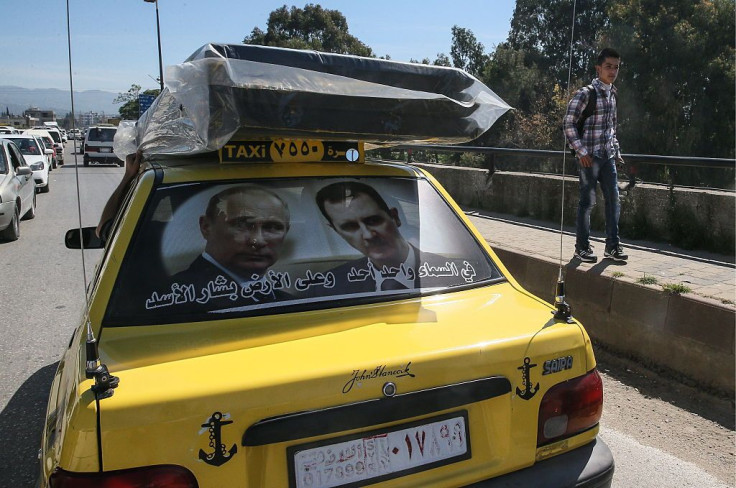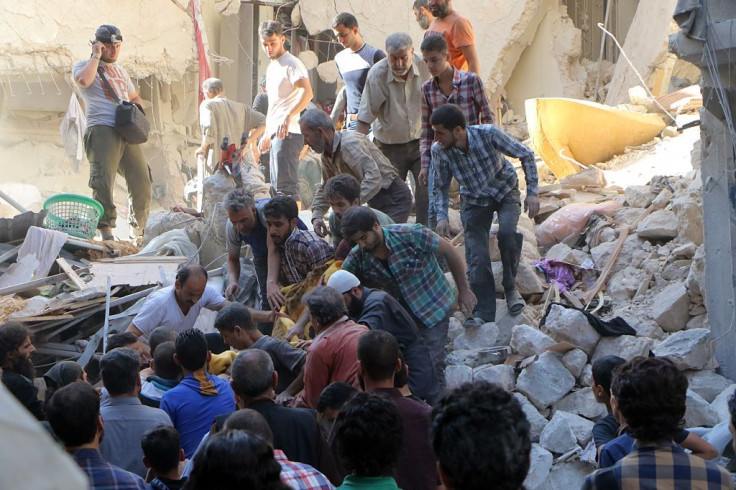Why Is Russia Bombing Aleppo? Everything You Need To Know About Moscow's War In Syria

Following yet another breakdown of talks between global leaders, Russia has intensified its bombing campaign against the Syrian city of Aleppo. The latest reports estimate at least 15 civilian deaths as Russian jets bombarded a market Wednesday in the rebel-held side of the city.
Despite a humanitarian outcry, Russia adamantly defends its position in supporting Syrian President Bashar al-Assad. This puts Moscow at odds with Western powers, who have continually attempted to establish a ceasefire and no-fly zone in Syria, including most recently with an ill-fated U.N. resolution Saturday that was backed by France and Spain.
As the conflict continues beyond its fifth year, Russia has emerged as perhaps the leading international actor in the Syrian civil war. Here's what you need to know about the country's involvement:
How did the Syrian war start? In early 2011, Syria experienced widespread anti-government protests during a time of regional uprising known as the Arab Spring. These demonstrations were aimed at the release of political prisoners, democratic reform and addressing corruption. The movement was met with harsh resistance from the Assad regime and his security forces, who that same year witnessed a revolution in Egypt and civil war in Libya. The security situation continued to deteriorate, however, and by July opponents of the government had organized into the Free Syrian Army and taken up arms, calling for total political upheaval.
International actors were quick to get involved. Western powers along with Turkey and Gulf states such as Saudi Arabia supported the rebels. Concerns grew, however, as radical groups such as the Nusra Front and the Islamic State began to appear in the ranks of the opposition and quickly gain ground. In 2014, the United States and allies created the Combined Joint Task Force - Operation Inherent Resolve and started conducting airstrikes against the Islamic State, signaling a shift in focus from toppling Assad to halting the advance of radical groups in Syria and Iraq. Even as in-fighting between Islamists, moderates and Kurds broke out, however, it seemed the only certain outcome was the fall of Assad.
That changed in 2015 when Russia, who previously defended Assad politically, staged a massive intervention on behalf of the Syrian government. Russian jets began bombing with much higher intensity than the U.S.-led alliance. This continued bombardment has come with reports of substantial civilian casualties and even calls from the international community for an International Criminal Court investigation of whether Russia has committed war crimes.
Russia's campaign in Syria "has killed no less than 2,704 civilians including 746 children and 514 women," according to the Syrian Network for Human Rights, an activist-run advocacy group based in the U.K.
Map of #Syria (before the Russian intervention and now) via @AFP (plus some #data on civilian #casualties) Russia# pic.twitter.com/ZJCDuA4IqD
— Venus in Arms (@ViA_blog) October 1, 2016
Why is Russia involved in Syria? Let's take it back a bit: Modern Russian-Syrian relations reached a milestone in 1971 when the Soviet Union established a naval base in the Syrian coastal city of Tartus. Throughout the Cold War, the two nations remained allies and today the fleet remains Russia's only military facility in the strategic Mediterranean region.
Syria has also been a consistent buyer of Russian arms. From 2007-2011, Russia accounted for 78 percent of Syria's military imports, including aircraft and high-tech missile systems. When Russia intervened in 2015 to save the ailing Syrian Army, orders skyrocketed to $56 billion.
Russia's military presence is largely seen as having turned the tides of war for Assad, whose troops have secured a number of strategic victories in the past year including in the historical city of Palmyra, which even prompted Sen. Dick Black of Virginia to visit the city in support in April. A week later, Russia held a concert at the same spot where ISIS had slaughtered over two dozen in July 2015.
A #Russian soldier with the #SAA in #DeirEzzor #Syria. #Russia pic.twitter.com/O64jl4fD7j
— Hamosh 🇱🇧 (@Hamosh84) July 21, 2016
What is the Russia, Syria, Iran alliance about? Russia's heavyhanded moves in Syria don't only work to gain territory, but serve as a great exhibition for its military might. Whereas the West appeared hesitant in its Syria policy, Russia's actions showed that it too can be an global player, and an effective one.
While arguably the most influential, Russia is not the only international factor standing with Assad. Iran, a powerful regional force, is supporting the Syrian Army directly and through its ally, Lebanese-based Hezbollah. Russia and Iran's mutual distrust for the West has forged a de facto alliance in recent years and Syria became the perfect exhibition for the nations' mutual ambitions.
The extent of Iran and Russia coordination in Syria reached a new level in August when Iran allowed the Russian Air Force use of its Shahid Nojeh Air Base to conduct operations in Syria. This move was met with criticism by Iranian hardliners who felt that the move violated the country's constitution, drafted in the wake of the 1979 Islamic Revolution. Despite some tensions, however, the alliance continues to hold and probably will for sometime.
How will the war in Syria end? Russia has been criticized for using terrorism as a blanket term to refer to all opposition to Assad. Meanwhile, Russia has accused Western countries such as the U.S. of protecting or even supporting terrorists by backing the opposition. Most recently, Russia ratified a treaty Friday establishing a permanent military air base in Syria, its first in the Middle East.
The country's position as permanent security council member at the UN means no resolution without Russian support can succeed. This is especially bad news for cities like Aleppo because, as what happened with France and Spain's UN resolution last week, Russia will systematically reject any implementation of a no-fly zone. Moscow argues that the cessation of bombing only leads to increased terrorist activity on the ground.

It remains uncertain exactly how a post-war Syria would look as Western-backed rebels, the Kurds, Islamist forces, the Islamic State and the Syrian Army and its allies continue to rage warfare on the ground, all attempting to carve out a piece of the embattled nation for themselves. As long as Russia dominates the skies, however, Assad enjoys a significant military and political advantage over his opponents.
© Copyright IBTimes 2025. All rights reserved.






















